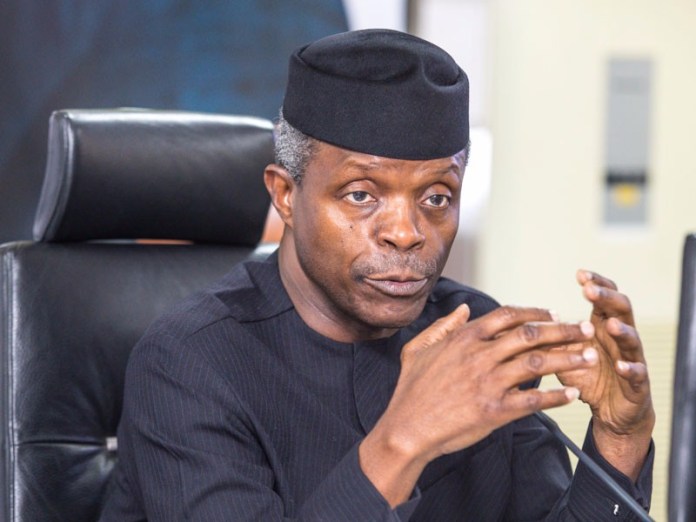- Osinbajo Panel Quizzes Magu, as Committee Begins Sitting
The Acting Chairman of the Economic and Financial Crimes Commission, Ibrahim Magu, was on Friday quizzed by the committee set up by President Muhammadu Buhari to investigate the suspended secretary to the Government of the Federation, Babachir Lawal, and the suspended Director-General of the National Intellegence Agency, Ambassador Ayo Oke.
The three-man committee which is chaired by Vice-President Yemi Osinbajo has the Attorney-General of the Federation, Abubakar Malami (SAN); and the National Security Adviser, Babagana Monguno, as members.
Magu appeared before the committee members for hours at the Vice-President’s office inside the Presidential Villa, Abuja as the committee began sitting early Friday.
It was gathered that the EFCC chairman was asked questions on the recovery of N13bn, which the Director-General of the National Intelligence Agency had claimed belonged to the agency.
It was learnt that Magu justified the raid on the Ikoyi apartment where the money was recovered and briefed the committee on the investigation into the operation.
A top government source said, “The meeting with Magu was part of the assignment of the committee. He was asked questions on the operation and as expected he justified it.”
It was gathered that the committee asked the EFCC to continue with its investigation into the recovered money.
At about 1.30pm, the committee went on a short break to allow Malami, Monguno and Magu attend the Juma’at service inside a mosque located beside the President’s office.
The three of them returned to continue the meeting after the prayer session.
Holding about two bulky brown envelopes and an official file, Magu left the committee members at about 4pm.
He told some reporters who approached him that he would still return to the venue, apparently to avoid granting interview.
Monguno and Malami left the venue at about 4.20pm.
When asked how the investigation was going, Malami directed reporters to the Vice-President.
“Go and ask the chairman (of the committee),” the minister simply said as he walked out of the premises.
It was the EFCC under Magu’s leadership that recovered N13bn ($43.4m, N23m and £27,000) at a residential building in Lagos.
The suspended DG NIA had laid claim to the recovered fund.
Following the discovery of the N13bn, the NIA, which is Nigeria’s foreign intelligence service, had claimed that the money, which was found on the seventh floor of the building, was approved for the agency by former President Goodluck Jonathan for covert operations and security projects covering a period of years.
But later in the day, Rivers State Governor, Nyesom Wike, also claimed the money belong to the Rivers State government, alleging that a former governor of the state and current Minister of Transportation, Mr. Rotimi Amaechi, kept the money in the apartment. He described the claim that the cash belonged to the NIA as balderdash.
Wike alleged that the money was part of the proceeds from the sale of a gas turbine by the immediate past administration, adding that the gas turbine was initially built by the Peter Odili administration. He then gave the Federal Government a seven-day ultimatum to return the money or be ready to face legal action.
Meanwhile, President Muhammadu Buhari on Friday joined Muslim faithful for the Juma’at service inside a mosque at the Presidential Villa, Abuja.
Buhari was joined at the prayer session by the Niger State Governor, Abubakar Bello; Minister of Defence, Mansur Dan-Ali; Malami; Monguno; Magu; and the Director-General of the Department of State Services, Lawal Daura.
Others who joined the President at the service were his Chief of Staff, Abba Kyari; Permanent Secretary, State House, Jalal Arabi; and the President’s Senior Special Assistant on Media and Publicity, Garba Shehu, among others.
That was Buhari’s first public appearance for the week.
Shortly after the session, the President returned to his residence while Monguno, Daura and Magu engaged in a long discussion at the forecourt of the President’s office.
It was the DSS under Daura that issued a security report which formed the basis for the Senate’s rejection of Magu as the substantive chairman of the EFCC.
The DSS had claimed that Magu lacks the integrity to drive the present administration’s anti-corruption war.
The Vice-President had however disclosed that the Presidency would not replace him.
Meanwhile, the Federal Government has announced the postponement of the annual retreat of the Secretary to the Government of the Federation with Secretaries to State Governments.
Although no reason was given for the decision, it was however not clear if the postponement had to do with the suspension of the embattled SGF over grass cutting contract inflation scam.
A terse statement issued in Abuja on Friday with Ref. No: PPR/OSGF/PR/03 by the Director of Press and Public Relations in the Office of the SGF, Bolaji Adebiyi, did not give any explanation.
The statement read, “The annual retreat of the Secretary to the Government of the Federation with Secretaries to State Governments scheduled to hold in Yola, Adamawa State, from April 23 to 25, 2017 has been postponed.
“A new date will be communicated to all participants and invited guests in due course. The Office of the Secretary to the Government of the Federation regrets any inconveniences.”


 Forex4 weeks ago
Forex4 weeks ago
 Naira3 weeks ago
Naira3 weeks ago
 Billionaire Watch3 weeks ago
Billionaire Watch3 weeks ago




 Naira3 weeks ago
Naira3 weeks ago








 Naira3 weeks ago
Naira3 weeks ago


 Naira2 weeks ago
Naira2 weeks ago








 Naira2 weeks ago
Naira2 weeks ago








 Naira4 weeks ago
Naira4 weeks ago























